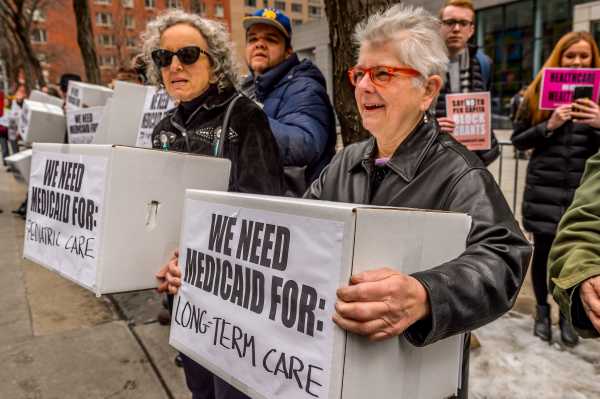
Maine voters overwhelmingly supported Medicaid expansion last November, but it still hasn’t happened yet. And it may just be their vote to choose the next governor that finally finishes the job.
Outgoing Republican Gov. Paul LePage has deployed every tool at his disposal to stop Maine from expanding Medicaid to 70,000 of Maine’s poorest residents, as voters said they wanted in a 2017 ballot initiative by an overwhelming 18-point margin. Claiming it would cost too much money for the state (the vast majority of the cost is shouldered by the federal government), LePage’s government missed the April deadline set in the ballot initiative to officially expand the program under the Affordable Care Act.
But LePage is term-limited, forced out of office in 2019. The race to replace him should be one of 2018’s most competitive gubernatorial elections in the country, giving Democrats a major chance to reclaim a governorship. Mainers will vote this Tuesday to select Democratic and Republican candidates for the general election, under a new ranked-choice system.
Expansion supporters are pursuing legal action against LePage to force him into implementing it quickly. But if courts don’t rule in their favor or if the fight drags out, the fate of Medicaid expansion is very much at stake in the fall election. All the major Democratic candidates want to expand the program as soon as possible. All the Republicans oppose it.
Paul LePage’s Medicaid expansion obstruction, briefly explained
Paul LePage really hates Medicaid expansion. He vetoed five different bills passed by the Maine legislature to expand the program under Obamacare, arguing that it was too expensive for the state, even though the federal government initially covered 100 percent of the costs and will cover 90 percent in perpetuity. He has sought to cut the existing Medicaid program by instituting work requirements and requiring beneficiaries to pay more out of pocket for health care.
When Maine voters said they wanted to expand Medicaid, LePage was still defiant. He said he would only expand the program if state lawmakers came up with some very specific and potentially unrealistic ways to pay for it — conditions that were not set in the ballot initiative that voters approved.
Medicaid expansion supporters quickly sued to try to force LePage to expand Medicaid under the referendum. They are winning too: Last week, a state judge ordered LePage to file paperwork for Medicaid expansion very soon. The governor’s office has already appealed the court decision.
If the courts back up expansion supporters, the state could be compelled to follow the ballot initiative before the end of the LePage administration. But it is possible — whether because they lose in court or because the next state legislature and governor need to appropriate the state’s share of the costs — that the issue won’t be resolved before LePage leaves office. The next governor could also try to roll back the expansion once they get into office.
“The next governor could act to thwart that or to try to repeal the law. So the gubernatorial obviously matters,” Robyn Merrill, executive director of Maine Equal Justice Partners, which is leading the legal fight for expansion, told me. “But it is our hope and it is more than likely that people will be getting coverage under expansion before next January.”
The Democratic candidates for governor are ready to expand Medicaid
Whatever differences there are among the Democratic candidates, Medicaid expansion is not one of them. Every major candidate wants Maine to finally follow through and expand coverage to its poorest residents.
“The evidence is overwhelming: states that expand Medicaid have lower healthcare costs, healthier citizens, more stable hospital systems and stronger economic growth,” Janet Mills, Maine’s attorney general, who is considered the leading Democratic contender, told a local newspaper. “I’m fully committed to ensuring Medicaid expansion is implemented now, in accordance with the will of the people.”
In the best poll we have of the race, Mills — attorney general since 2013, a state lawmaker before that — was way ahead of the field, with 32 percent of the vote. But Maine is using a new, first-of-its-kind ranked voting system, which adds a little more uncertainty to the race.
In a traditional primary election, the candidate who gets the most votes, whatever that number is, wins. Obviously. But here is how Maine’s new voting system works, as helpfully described by the Huffington Post’s Sam Levine:
So while Mills is the frontrunner, she has some credible challengers. Mark Eves, a former Maine House speaker, had 16 percent of the vote, good enough for second place, in the poll we have. State Sen. Mark Dion had 10 percent. Democratic organizer Adam Cote was the other notable finisher at 9 percent.
Whichever candidate emerges from the process will be a Democrat who wants to expand Medicaid.
The Republican candidates want to keep blocking Medicaid expansion
Meanwhile, a victorious Republican candidate in the governor’s race could continue to gum up the Medicaid expansion process. Every prominent GOP candidate is following LePage’s lead and opposes it, no matter the outcome of last November’s referendum. (And, on the whole, they are tying themselves as closely as they can to the outgoing governor.)
Business executive Shawn Moody, the leader in the Republican primary based on the best available polling, effectively deemed the 2017 vote in favor of Medicaid expansion invalid in a statement to the Portsmouth Herald:
Much like Mills on the Democratic side, Moody looks like the frontrunner — he had 36 percent of the vote in that poll — but he doesn’t seem to have a majority and faces several credible Republican challengers.
Mary Mayhew — who, as LePage’s top health official, has been instrumental in helping to block the Medicaid expansion — came in second at 19 percent, and she has also said she will continue to oppose it. Garrett Mason, the Maine Senate majority leader, registered third at 15 percent, and House Minority Leader Ken Fredette was fourth with 10 percent.
So in a mirror image of the Democratic content, there seems to be no daylight between the Republican candidates on Medicaid expansion. They all want to stop it.
Whoever emerges from both parties’ primaries, the November general election should be competitive. Cook Political Report rates the race a toss-up, while the University of Virginia’s Crystal Ball thinks it leans toward the Democrats. LePage is pretty unpopular: 41 percent of Mainers approve of his job performance and 53 percent disapprove, according to Morning Consult. Then again, he’s been elected twice and Donald Trump lost narrowly (3 points) in 2016.
In the end, Democrats should have an advantage, and they have a popular issue in Medicaid expansion at their back.
For more on Medicaid, please listen to the June 11 episode of Today Explained.
Sourse: vox.com






